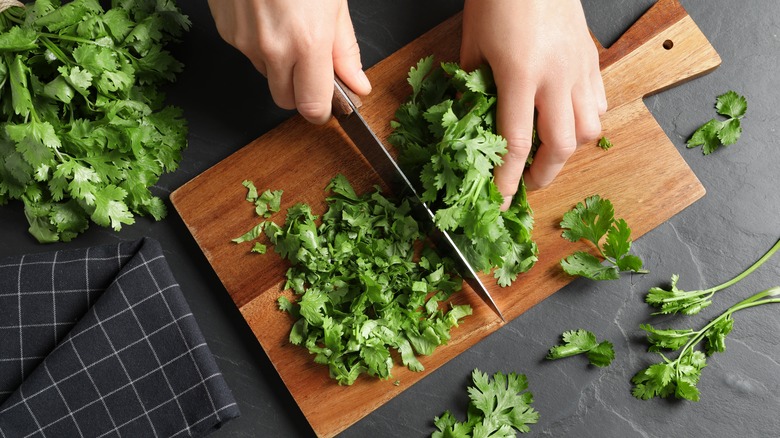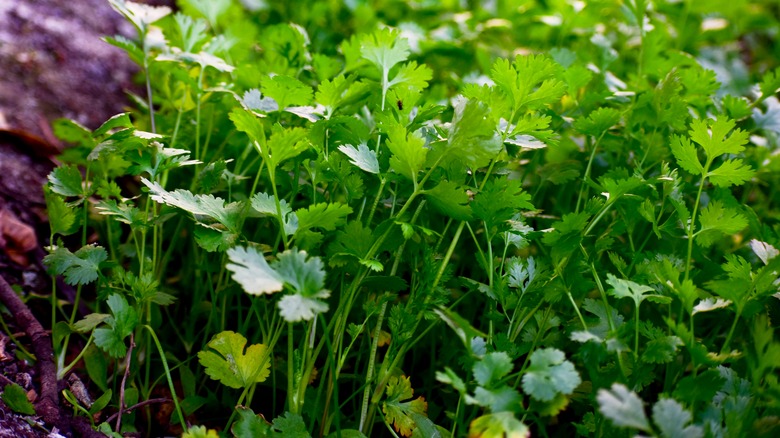It May Be Possible To Overcome Your Hatred Of Cilantro
Julia Child said she picks cilantro out of her meals and "[threw] it on the ground," per Mental Floss. In an episode of the Vice podcast "Munchies" (via CookingLight), Ina Garten revealed that she hates it, too. Garten — like lots of folks — thinks cilantro smells and tastes like soap. It's no secret that the herb gets a bad rap, and cilantro lovers might say it's "thyme" for a change — sincere apologies for the pun.
Cilantro comes from the leaves of the coriander plant (per Healthline). To folks who enjoy it, cilantro tastes pleasantly pungent and lemony with a characteristic brightness. It's a popular ingredient in Middle Eastern, Asian, Indian, and Mexican culinary stylings – salsa or fish tacos, anyone? Clearly, there's something worthwhile going on with the controversial herb.
But, if cilantro tastes like soap to you, there's an actual reason why. The soapy flair comes from a naturally occurring chemical called aldehyde, which is found in cilantro leaves and also commonly used in soap, explains genetics firm 23andMe. Per a study published by Cornell University, the specific culprit is a gene called OR6A2. According to the study, differences in OR6A2 can make some people more sensitive to detecting aldehydes than others.
Although, while your predisposition to liking (or hating) cilantro does have a genetic basis, your DNA might be less influential to your stance than you think. It may be possible to overcome your hatred (or dislike) of cilantro.
Don't knock it till you try it (over and over again)
A study published in Flavour journal found that people may have some ingrained cilantro bias based on ethnicity. Two University of Toronto nutritionists asked roughly 1,4000 subjects aged 20-29 about their palette preferences via a survey. Per the study, 21% of respondents of East Asian descent didn't like cilantro, compared to only 7% for South Asians, 4% for Hispanics, and 3% for Middle Easterners.
But, is this the product of nature or nurture? Do these folks like cilantro because they were born liking it? Or because it's common in the foods they grew up eating, and they're used to it? Neuroscientist Jay Gottfried tells The New York Times that repeated exposure to cilantro can negate initial aversion to it. Nicholas Eriksson (leader of the 23andMe and Cornell studies) tells NPR that humans' genetic coding for OR6A2 isn't so strong that it cannot be overridden.
To trick yourself into liking cilantro, start by crushing the leaves before you use them. According to The Washington Post, crushing cilantro breaks up the natural bonds that give cilantro its aroma. For extra masking, food scientist Harold McGee recommends incorporating that cilantro into pesto, via the New York Times. If physically breaking those bonds eliminates the soapy taste, then pesto could be the grind-it-down recipe for a newfound love of cilantro. Try experimenting with new dishes, pairing the herb with foods you already enjoy, and you may be able to adjust to its soapy taste.

